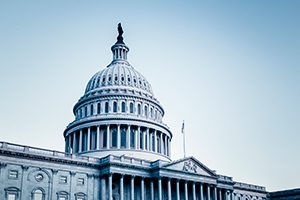Senate Finance Committee Holds Hearing on Paid Leave
 On October 25, the Senate Finance Committee held a hearing on federal paid leave. This comes as congressional Democrats and Republicans have shown interest in finding bipartisan consensus for a federal paid leave program. The hearing also provided policymakers and witnesses the opportunity to discuss the promise and drawbacks of paid leave proposals.
On October 25, the Senate Finance Committee held a hearing on federal paid leave. This comes as congressional Democrats and Republicans have shown interest in finding bipartisan consensus for a federal paid leave program. The hearing also provided policymakers and witnesses the opportunity to discuss the promise and drawbacks of paid leave proposals.
Increasing employee access to paid leave was a primary focus of the hearing. Both sides of the aisle agreed that all workers will need to take leave during their careers without the obligation to juggle work requirements. Policymakers highlighted that 70 percent of Americans want national paid leave and that 72 percent of Americans who are not currently working cite caregiving and family responsibilities as the main reason. To address these issues, Democrats argued for a federally mandated paid leave program, while Republicans worried that a one-size-fits-all program could limit employer-provided paid leave options and be difficult to implement on a wide scale.
Witnesses Describe Potential Benefits of Federal Paid Leave
Some of the witnesses discussed the benefits of a federal paid leave program, concluding that better access to paid leave would benefit workers, employers and the economy. Jocelyn Frye, president of the National Partnership for Women & Families, stated that offering paid leave tends to benefit both workers and employers through increased labor force participation (both for women and generally), worker retention, and wage growth. Ben Verhoeven, president of Peoria Gardens Inc., added that investing in paid leave gave him better return on investment than his capital investments, as implementing paid leave increased business growth and employee retention and promotions.
Objection to a One-Size-Fits-All Leave Program
Despite these benefits, Elizabeth Milito, executive director of the National Federation of Independent Business’s Small Business Legal Center, said that employers would face trade-offs under a federal paid leave program. Milito argued that employers operating on the same amount of funds but under new federal benefit requirements would be obliged to provide paid leave as a benefit, leading to some employers being unable to provide higher compensation or other benefits like health insurance. Rachel Greszler, senior research fellow at The Heritage Foundation, said that in response to state paid leave programs, some companies choose to send workers to the state program first and then supplement the paid leave benefit to provide 100 percent wage replacement. This creates an administrative burden for the employee, who receives full wage replacement only if they participate in both paid leave programs.
Republicans and their witnesses also said that a federal program would require flexibility and simplicity to be most effective. Milito and Greszler concurred that most small businesses do not have a qualified HR professional to deal with additional compliance needs. Greszler also stated that the biggest unintended consequence of a one-size-fits-all approach would be a rigid structure that does not work for most employees and businesses. She specified that a carve-out for small businesses or the ability to opt in to a federal program would be most appropriate.
CUPA-HR continues to monitor for any updates on federal paid leave programs and will keep members apprised of any new developments.


